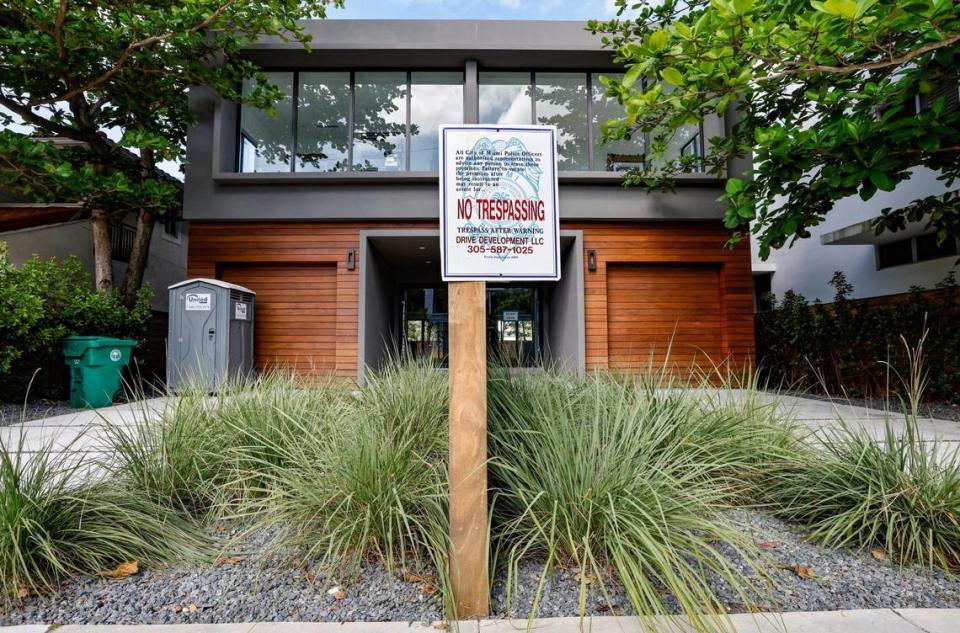A breakthrough in alleged real estate fraud case against the ‘King of Coconut Grove’
When Phillip Sylvester first met Doug Cox and Nicole Pearl, he was impressed by their charm, skill and professionalism. Cox, with his experience in construction, knew how to build houses. Pearl, with her real estate license and University of Miami law degree, knew how to sell them.
Given Sylvester’s expertise in finance and his wife’s background as an architect, he figured the two couples made a “dream team” for developing homes in Coconut Grove.
But forming a partnership with Cox turned out to be the worst mistake of Sylvester’s career, one that cost him $8 million in a business deal gone awry and cost home buyers $22 million in deposits, and an incalculable amount in broken dreams.
All, they claim in lawsuits, were conned by Cox, owner of Drive Development and Send Enterprises and self-proclaimed “King of Coconut Grove.”
Sylvester has made it his mission to reclaim the 27 Grove properties Cox was attempting to sell and get back the money Cox’s creditors lost. By brokering a breakthrough in the alleged fraud case, Sylvester is one step closer to his goal.
Cox, accused in the suits of running a real estate Ponzi scheme, signed double and triple purchase contracts with unsuspecting buyers on the same house. He did it again and again on more houses for sale without disclosing to buyers that contracts already existed. He collected deposits that escalated in price as the houses escalated in value over four years. Yet 12 townhouses on Coconut Avenue, lacking only finishing touches and certificates of occupancy, still sit empty, a row of pristine ghost homes in one of the hottest markets in the country.
Buyers who put down their life’s savings and were promised they were two or three months away from closing have been living on hold and losing hope that they’ll ever be able to move in. Cox kept postponing closing dates with them while Pearl recruited new buyers who put down fresh deposits. Cox also took deposits on a dozen undeveloped lots, two more townhouses and a single-family home in the Grove.
But, in paying a debt to Cox’s chief creditor, Sylvester is not only removing an impediment that would have stalled progress for years in court, but clearing a path for victims to recover at least half their money.
Settlement with lender
The settlement of a $33 million loan by Altamar Financial Group to Cox was approved by Miami-Dade Circuit Court Judge Thomas Rebull on Dec. 19. Sylvester will put up the money in exchange for first dibs on buying the properties from the court-appointed receiver who controls them.
“My client has worked extremely hard, including coming out of his own pocket to get this done,” said Sylvester’s attorney, Marcos Jimenez, a former U.S. Attorney in Miami. “His intention has been to shine a light on the fraud committed, which started with defrauding Mr. Sylvester and continued with defrauding buyers.”
Cox has declined to talk to the Herald about the allegations.

Even after Altamar is repaid, another $41.5 million in claims from buyers, investors and lenders remains unresolved. None of that missing money has been recovered from Cox, whose bank accounts contained a total of $260, according to court records. The 27 properties — the townhouses and the lots — are estimated to be worth $65 million.
Altamar’s insistence that the entire $33 million loan be repaid with 24.5 percent interest that had been accruing at a rate of more than $22,000 per day was termed “the elephant in the room” by Miami-Dade Circuit Court Judge Jennifer Bailey, who was previously overseeing the case. Bailey questioned why Altamar gave Cox six extensions on the 2019 loan despite the fact that Cox was not closing sales on any of the properties. She questioned why Altamar did not foreclose on Cox’s troubled companies until after a March 13 Miami Herald story revealed the buyers’ plight.
READ MORE: They bought their dream homes from the ‘King of Coconut Grove.’ They still can’t move in
Altamar contested a scheduled Sept. 15 auction of the 12 undeveloped lots, delaying the case for three months as it was deliberated in the 3rd District Court of Appeal, and adding to the interest tally. Altamar argued it had first rights to the properties Cox had used as collateral if he defaulted on the loan.

READ MORE: Auction of a dozen disputed lots owned by ‘King of Coconut Grove’ put on hold
Sylvester offered Altamar $25 million in May to withdraw its claim and exit the case. Altamar, a Miami-based direct private lender, turned him down.
Nor would Altamar’s representatives meet with receiver Alan Fine, the former Miami-Dade Circuit Court judge who was appointed by Bailey to consolidate the lawsuits against Cox, take control of the properties and recover as much money as possible for Cox’s creditors. Sylvester filed an emergency motion for a receiver after learning about Cox’s alleged fraud in the Miami Herald article, confronting Cox in person and realizing he’d been double-crossed.
Sylvester, 57, son of a Chicago police officer, made his fortune as a trader, pursued real estate investing and moved his family to Miami. He originally hired Cox to build a handful of homes in 2014 and then formed a joint venture with Cox in 2019 to buy more land and build more homes. Almost five years later, he finds himself re-buying those properties at a higher cost.
“From the outset, when he moved for the appointment of a receiver, Mr. Sylvester has shown a strong interest in being helpful and facilitating a recovery for the victims of fraud,” said Paul Singerman, Fine’s attorney.
Negotiating through the night
Fine, Singerman, Sylvester and Jimenez got Altamar to the negotiating table on Nov. 16. Altamar managing partner Patricio Filippi and his attorney Mitchell Mandler agreed to meet for a mediation session conducted by retired Miami-Dade Circuit Court Judge Michael Hanzman, who presided over the $1 billion settlement of damage claims in the 2021 collapse of the Champlain Towers South condominium in Surfside that killed 98 people.
During the session, Fine and Jimenez argued that Altamar could or should have known that the money Cox used to make a $15 million payment on his loan was not coming from revenue on the unsold properties but from buyers’ deposits. Cox hasn’t closed a house sale since 2019. Altamar denied any knowledge of the source of Cox’s payment.
Fifteen hours later, at 1 a.m., Altamar agreed to take $33 million, $15 million less than the $48 million it was seeking, and withdraw its appeal of the auction.
“It was a hard-fought negotiation and I wasn’t sure it would happen in the last two hours,” Fine said during the hearing with Rebull. “We had counterclaims and laid out our usury and unclean hands arguments against Altamar.
“We knew without a settlement we’d be in litigation with Altamar for at least one, maybe two years without any certain outcome,” Fine told the judge. “And that until the Altamar claim was resolved, we could not enable the process to sell and monetize the property and use it to satisfy the claims of creditors.”
The settlement includes a provision that neither Altamar nor Sylvester can be sued by the creditors.
“It was a very complicated mediation and everyone dug in on their positions,” said Mandler, Altamar’s attorney. “We hope this will allow creditors to receive a substantial return on their investments.”
Singerman, Fine’s attorney, said the settlement equates to a $15 million discount on what Altamar was demanding.
“This settlement avoids years of expensive, protracted and high-risk litigation, prevents the accrual of more interest and creates the possibility for a meaningful and prompt distribution of funds to the buyer depositors and other creditor constituents that would, at best, be delayed and, at worst, be impossible without the agreement,” he said.
Jimenez hailed the compromise but cautioned that obstacles remain.
“Mr. Sylvester has concerns, such as the ability to get title insurance and a prompt sale of the lots,” Jimenez said.
Sylvester was top bidder in the September auction for the 12 undeveloped lots that was put on hold. He plans to purchase them from Fine for $16.5 million, infusing the receivership with money as Fine continues his efforts to sell Cox’s assets and find millions still unaccounted for.
Fine noted that one of the bidders, a firm named Liquidis that bid $64.5 million for all 27 properties, was rejected because it submitted fraudulent proof of funds. Cox had encouraged Fine to accept the Liquidis bid, Fine said at a previous hearing.
Buyers still have concerns
Some buyers of the townhouses on Coconut Avenue who have been waiting to move in and listening to Cox’s excuses for two, three or five years are relieved that the case will progress but question why they had no input on the terms of the settlement. They knew nothing about the mediation until after it was completed.
“Based on my math, Altamar is getting a minimum 40% return on their investment. They allowed multiple forbearances, and only attempted foreclosure after the Herald article, while continuing to take interest payments,” said Michael Coyne, who was supposed to close on his $1.625 million Coconut Avenue townhouse in June 2021. He put down $487,500.
Coyne asserts that Altamar had to be aware it was accepting tainted payment money from Cox, which Altamar denies.
“Why is this allowed, and why aren’t they required to send the money back?” he said. “We had no say whatsoever yet are being told we cannot take legal action against the parties of the mediation.”
Coyne and his wife, Oksana, transplants from New York, have three children; their twin daughters were born in August 2021. They’re living in Miami with Oksana’s parents who are from Ukraine. They, like other families who thought they were purchasing ready-to-move-in homes, have lived in a series of different rentals with belongings in storage while Cox repeatedly assured them their closing date was coming, then stopped responding to them altogether.

Cox tried to placate buyers by saying he was on the verge of completing final inspections with the city of Miami’s building department and obtaining the certificates of occupancy necessary to close.
But Fine’s investigation shows that Cox was far behind on the permitting process because he failed to submit proper plans and construction did not comply with code regulations.
Fine’s forensic accountants found that as Cox fell into deeper financial straits, he took out more loans at exorbitant interest rates and would use a new loan to pay off an old one. Fine said it’s been difficult to follow Cox’s tangled money trail, baffling financial decisions and “very unusual numbers that are calling our attention.”
At the same time, Cox continued building, even through a Stop Work order issued but not enforced by the city. He signed more purchase contracts and collected more deposits on houses that had increased in value since the COVID pandemic and subsequent influx of new Miami residents. The deposits did not go into escrow accounts but into the pockets of Cox and Pearl, the lawsuits allege.
As an example of Cox’s juggling act, the townhouse at 2960 Coconut Ave. has had four contracts on it, three presently, with deposits ranging from $500,000 in 2020 to $1.52 million in January.
Tougher rules on developers called for
“While I appreciate the efforts the receiver has made to negotiate with Altamar, there was not a single thing that came out of the settlement that gives us any guarantees,” Coyne said. “Funny that not a single party at the mediation ever did anything to stop Cox, but, as usual, everyone’s interests but those of the buyers are represented.”
He and other buyers believe they are the most vulnerable victims. They want the case to spur tougher oversight by the city’s building inspectors, rigorous state laws that protect consumers who sign contracts with developers and sharper focus on fraud by South Florida law enforcement agencies. Several buyers have taken their complaints to Miami Mayor Francis Suarez, the Miami-Dade State Attorney’s Office and the FBI but haven’t heard back.
“Unless something changes, this is a business model that can easily be replicated,” Coyne said. “Start new construction with a loan and a deposit. If the market goes up, keep the buyer’s deposit and allow the lender to foreclose. If the market goes down, complete the project and close.”
Cox, Pearl and their three children were evicted from the house they were renting for $12,000 per month in Coconut Grove. Cox is believed to be in the Miami area. Pearl, who dialed in on Zoom for the hearing with Rebull, is thought to be in the New York-New Jersey area with family.
Like Sylvester, buyers were also charmed and impressed by Cox and Pearl. They are tortured by feelings of anger and regret. Some just want their deposits back. Others hope they’ll finally step across the threshold into their deferred dream houses.
Fine says he needs to sell the townhouses at market value to maximize payouts to creditors. Fine has already inquired whether the original buyers would be willing to pay current prices — double their contract prices, which ranged from $1.2 million to $1.8 million — to obtain their houses.
“We are one of the few parties that opened our mouth and did anything to stop what was happening,” Coyne said. “Despite the years of collusion between Cox, Pearl, city officials, and the lender, we still simply want to see our legally binding purchase agreements honored.”


